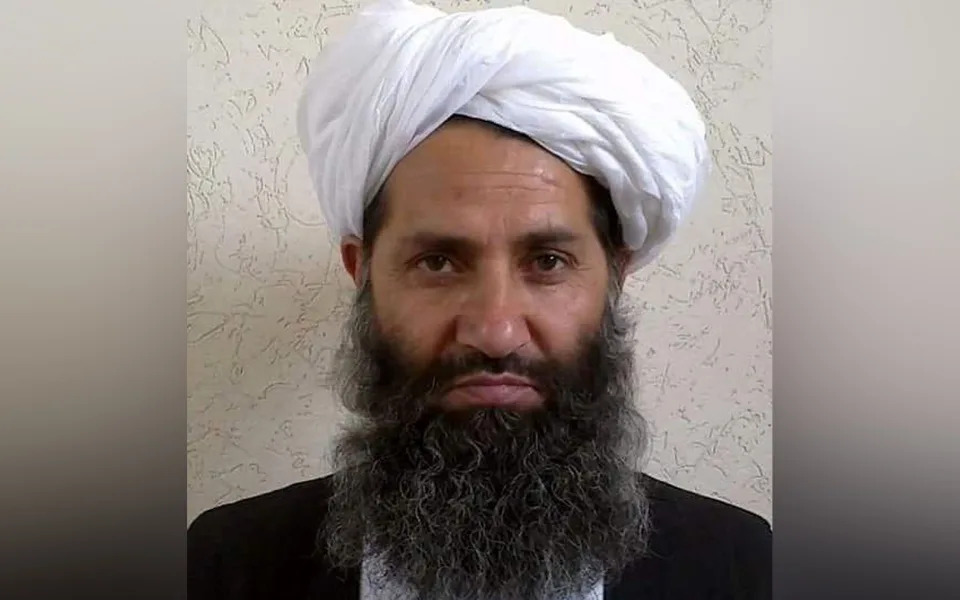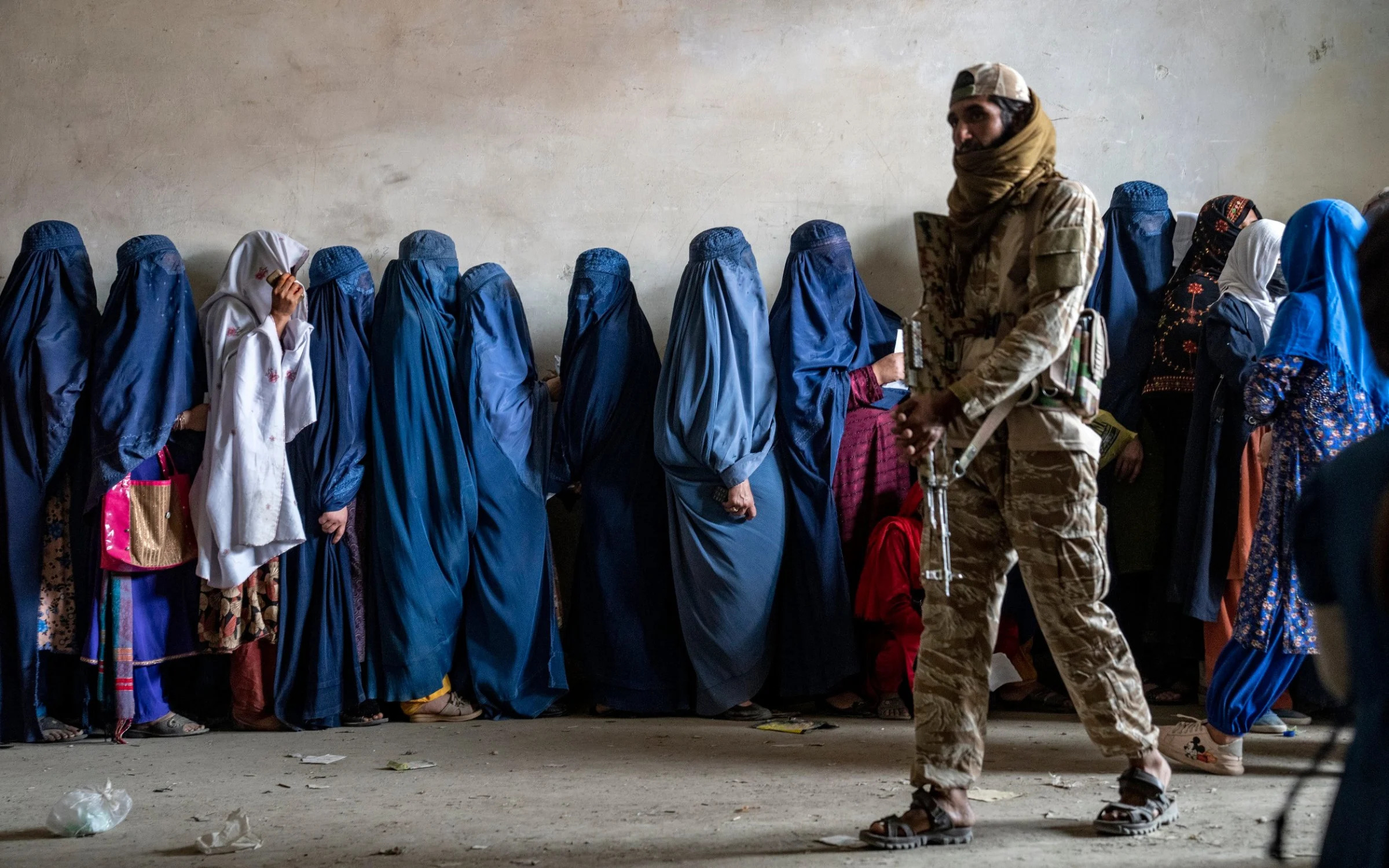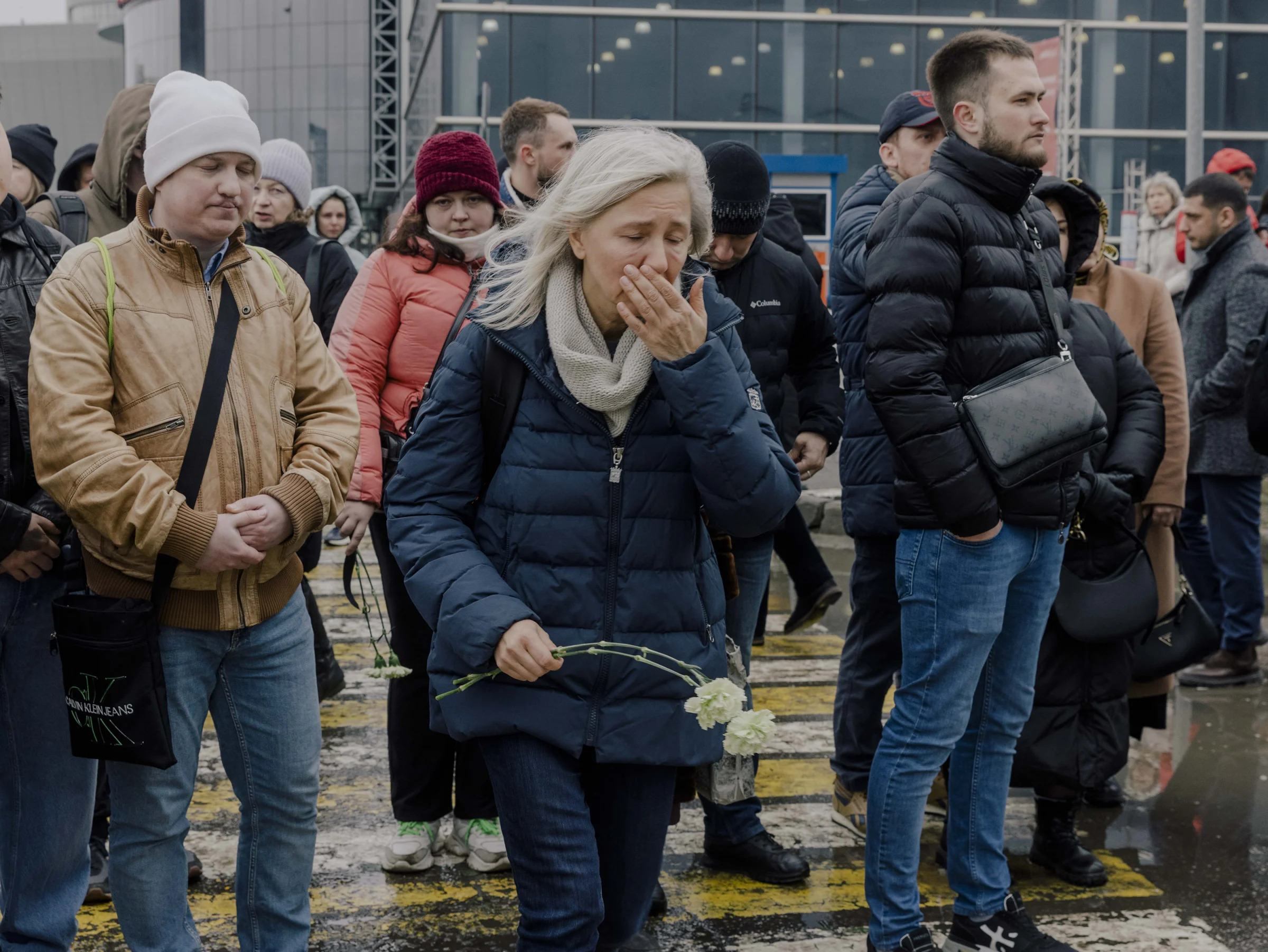The Taliban’s Supreme Leader has vowed to start stoning women to death in public as he declared the fight against Western democracy will continue.
“You say it’s a violation of women’s rights when we stone them to death,” said Mullah Hibatullah Akhundzada in a voice message, aired on state television over the weekend, addressing Western officials.
The Taliban has quickly returned to harsh public punishments in Afghanistan.
“But we will soon implement the punishment for adultery. We will flog women in public. We will stone them to death in public,” he declared in his harshest comments since taking over Kabul in August 2021.
“These are all against your democracy but we will continue doing it. We both say we defend human rights – we do it as God’s representative and you as the devil’s.”
Afghanistan’s state TV, now under Taliban control, broadcasts voice messages purporting to be from Akhundzada, who has never been seen in public aside from a few old portraits.
He is believed to be based in southern Kandahar, the stronghold of the Taliban.

Despite promising a more moderate government, the Taliban quickly returned to harsh public punishments like public executions and floggings, similar to those from their previous rule in the late 1990s.
The United Nations has strongly criticised the Taliban and has called on the country’s rulers to halt such practices.
In his voice message, Akhundzada said that the women’s rights that the international community had been advocating for were against the Taliban’s harsh interpretation of Islamic Sharia.
“Do women want the rights that Westerners are talking about? They are against Sharia and clerics’ opinions, the clerics who toppled Western democracy,” he said.
“I told the Mujahedin that we tell the Westerners that we fought against you for 20 years and we will fight 20 and even more years against you,” he said, emphasising the need for resilience in opposing women’s rights among Taliban foot soldiers.
“It did not finish [when you left]. It does not mean we would now just sit and drink tea. We will bring Sharia to this land,” he added. “It did finish after we took over Kabul. No, we will now bring Sharia into action.”
Women ‘living in prison’
His remarks have incited outrage among Afghans, with some calling on the international community to increase pressure on the Taliban.
“The money that they receive from the international community as humanitarian aid is just feeding them against women,” Tala, a former civil servant, told The Telegraph from the capital Kabul.
“As a woman, I don’t feel safe and secure in Afghanistan. Each morning starts with a barrage of notices and orders imposing restrictions and stringent rules on women, stripping away even the smallest joys and extinguishing hope for a brighter future,” she added.
“We, the women, are living in prison,” Tala said, “And the Taliban are making it smaller for us every passing day.”
ISIS-K, Group Tied to Moscow Attack, Has Grown Bolder and More Violent
People bring flowers to the Crocus city hall in memory of victims of terrorist attacks in Moscow, Russia on March 23, 2024.
Few know better than the Taliban what a relentless foe the Islamic State’s affiliate in Afghanistan can be.
Much of the West considers the Taliban, which reclaimed power in the country in 2021, to be an extremist Islamic movement. But the Islamic State-Khorasan, the affiliate that has been linked by U.S. officials to a terrorist attack in suburban Moscow on Friday, has slammed the Taliban government, calling the group’s version of Islamic rule insufficiently hard-line.
The Islamic State-Khorasan, or ISIS-K, is one of the last significant antagonists that the Taliban face in Afghanistan. It has carried out a bloody drumbeat of attacks throughout the country in recent years, seeking to use the violence to undermine the Taliban’s relationships with regional allies and to portray the government as incapable of providing security in Afghanistan, experts say.
In the months after the Taliban seized power, ISIS-K carried out near daily attacks on their soldiers at roadside checkpoints and in neighborhoods that are home to the country’s Hazara ethnic minority. The following year, ISIS-K fighters attacked the Russian Embassy in Kabul, Afghanistan, tried to assassinate Pakistan’s top diplomat to Afghanistan and sent gunmen into a prominent hotel in Kabul that was home to many Chinese nationals, seeking to undermine the Taliban’s promise of restoring peace.
More recently, ISIS-K’s attacks have grown bolder and stretched beyond Afghanistan’s borders: The group killed at least 43 people in an assault on a political rally in northern Pakistan in July. It killed at least 84 people in two suicide bombings in Iran in January. Now, U.S. officials say ISIS-K was behind the attack in Moscow, which killed at least 133 people.
In recent months, ISIS-K has threatened attacks against the Chinese, Indian and Iranian embassies in Afghanistan. It has also released a flood of anti-Russian propaganda, denouncing the Kremlin for its interventions in Syria and condemning the Taliban for engaging with Russian authorities decades after the Soviet Union invaded Afghanistan.
“ISIS-K has long been motivated by the logic of outbidding in its attacks,” said Asfandyar Mir, a senior expert at the United States Institute of Peace. “It seeks to outperform rival jihadis by carrying out more audacious attacks to distinguish its jihadi brand and assert leadership of the global jihadi vanguard.”
ISIS-K was established in 2015 by disaffected fighters of the Pakistani Taliban, an ideological twin and ally of the Taliban in Afghanistan. ISIS-K’s ideology spread partly because many villages in eastern Afghanistan and Pakistan are home to Salafi Muslims, the same branch of Sunni Islam as the Islamic State. The Taliban, in contrast, mostly follow the Hanafi school of Islam.
From its early days, ISIS-K has been at odds with the Taliban, fighting over turf in eastern Afghanistan and later denouncing the Taliban’s new government for not instituting what it views as true Shariah law. ISIS-K propaganda has sharply criticized the Taliban for working to establish diplomatic relations with non-Muslim countries, including the United States and Russia, describing the efforts as a betrayal of the global jihadi struggle.
Before the U.S.-led war in Afghanistan ended in 2021, American airstrikes and Afghan commando raids had contained ISIS-K mostly to eastern Afghanistan. But after the withdrawal of Western troops, the Islamic State’s reach expanded to nearly all of the country’s 34 provinces, according to the United Nations Assistance Mission in Afghanistan.
Since seizing power, the Taliban have carried out a relentless and often ruthless counterterrorism campaign to squash ISIS-K. Those efforts have prevented the group from taking any territory in Afghanistan and pushed many of its fighters into Pakistan, experts say. Taliban security forces killed at least eight of ISIS-K’s leaders in the country last year, according to U.S. officials.
The crackdown drew condemnation from human rights groups that claimed Taliban security forces were summarily executing and forcibly causing disappearances of people accused of being affiliated with the Islamic State in eastern Afghanistan, the group’s historic stronghold.
U.N. monitors also cautioned this year that the Taliban’s counterterrorism operations against ISIS-K “appear to be more focused on the internal threat posed to them than the external operations of the group.”
But even as ISIS-K cells have come under mounting pressure from Taliban security forces, the group has proved resilient and remained active across Afghanistan, Pakistan and Iran. Just a day before the attack near Moscow, the group carried out a suicide bombing in Kandahar, Afghanistan — the birthplace of the Taliban movement — sending a powerful message that even Taliban soldiers in the group’s heartland were not safe.
“The success by the Afghan Taliban didn’t change the degree of threat that the Islamic State-Khorasan posed in Afghanistan,” said Riccardo Valle, the director of research at the Khorasan Diary, a research platform based in Islamabad, Pakistan’s capital. “It simply forced the Islamic State to shift its military tactics.”
Now, rather than staging small hit-and-run attacks on low-level Taliban soldiers and police officers, ISIS-K has turned its focus to major attacks in Afghanistan and beyond, experts say.
Its propaganda has also painted the Taliban as “betraying the history of Afghanistan and betraying their religion by making friends with their former enemies,” Valle said, referring to Russia.
The messaging has stoked new fears of attacks by people who are not directly associated with ISIS-K but inspired by the group, experts say. It has also sought to drive a wedge between the Taliban and major powers like Russia, China and Iran that have recently warmed up to the Taliban authorities.
While no country has officially recognized the Taliban government, Russia accepted a military attaché from the Taliban in Moscow this month. China accepted a Taliban ambassador to the country. Both moves were seen as confidence-building measures.
After the attack in Moscow, Abdul Qahar Balkhi, a spokesperson for Afghanistan’s Foreign Ministry, said in a statement on social media that the country “condemns in the strongest terms the recent terrorist attack in Moscow” and “considers it a blatant violation of all human standards.”
He added: “Regional countries must take a coordinated, clear & resolute position against such incidents directed at regional destabilization.”




